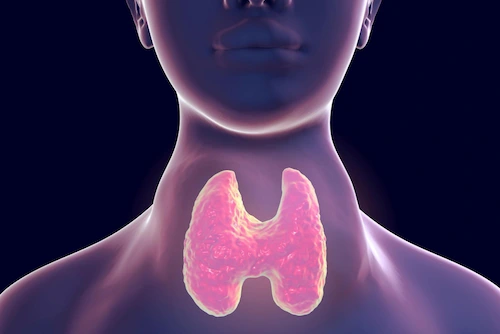In this article
Helicobacter pylori (H. pylori) is a type of bacteria that infects your stomach, often silently. H. pylori can have wide-ranging effects on your digestive health and even interact with hormonal conditions like hypothyroidism and menopause, as well as weight management. If you’re struggling with unexplained stomach symptoms, autoimmune thyroid diseases like Hashimoto’s, hormonal transitions, and stubborn weight issues, it’s essential to understand the role of H. pylori.
H. pylori is a spiral-shaped, gram-negative bacterium most commonly found in the pyloric region, which is the lower part of the stomach that connects to the first section of the small intestine. More than half the world’s population is thought to carry H. pylori, especially in areas with crowded living conditions or poor sanitation. This bacterium’s presence in the stomach doesn’t always cause symptoms, but when problems arise, they can be persistent and difficult to manage.
H. pylori is usually acquired during childhood, often through contaminated food, water, or close contact with infected individuals. Its ability to survive stomach acid allows it to persist for years, sometimes for a lifetime, in your stomach lining!
Many people with H. pylori infection don’t notice any apparent symptoms. When symptoms do occur, they usually stem from irritation or damage to your stomach lining, which can lead to conditions like gastritis (inflammation of the stomach) or peptic ulcers, and even gastric cancer.
Common symptoms include:
- Burning or aching pain in your upper abdomen, often worse when your stomach is empty
- Bloating
- Frequent burping
- Loss of appetite
- Nausea or upset stomach
- Unintended weight loss
In about 10 to 15% of cases, H. pylori leads to ulcers, including peptic ulcers, which are open sores in the stomach or duodenum (the first part of the small intestine). These can cause more severe symptoms, including persistent pain, vomiting, dark stool (a sign of bleeding), and feeling full quickly.
Diagnosis typically starts with a clinician reviewing your symptoms and risk factors, followed by one or more tests:
- Breath test: Measures the presence of H. pylori by how the body breaks down a tagged substance.
- Stool antigen testing: A stool test checks for H. pylori proteins in your stool.
- Blood test: Looks for antibodies your body created against H. pylori (less accurate for current infection).
- Endoscopic biopsy: Direct examination and tissue sampling of the stomach lining and gastric mucosa—used if ulcers or other complications are suspected.
There is a growing body of evidence suggesting a link between H. pylori infection and the development or modulation of autoimmune diseases. H. pylori can trigger autoimmunity primarily through molecular mimicry —where bacterial proteins closely resemble human proteins, prompting gastric inflammation and triggering the immune system to attack the body’s own tissues mistakenly.
H. pylori proteins can resemble human proteins, especially those in the stomach lining or other organs. This similarity confuses the immune system, leading to the production of antibodies and eventual tissue damage.
Persistent H. pylori infection also contributes to chronic immune stimulation and inflammation in the stomach and beyond, pushing the immune system toward a hyperactive, sometimes misdirected, state.
Not everyone with H. pylori develops autoimmune disease, of course. The risk is higher in those with family or personal history that predisposes them to immune dysregulation and autoimmunity.
Associated autoimmune diseases
H. pylori infection has been linked to several autoimmune conditions, including:
- Autoimmune Hashimoto’s thyroiditis: Studies show a higher rate of H. pylori infection in patients with autoimmune thyroid disease; eradication may reduce thyroid antibodies.
- Autoimmune gastritis
- Rheumatoid arthritis
- Systemic lupus erythematosus (SLE)
- Idiopathic thrombocytopenic purpura
- Sjogren’s syndrome
- Autoimmune liver diseases.
Does eradication of H pylori reduce autoimmune antibody levels
Eradication of H. pylori can reduce autoimmune antibody levels in certain autoimmune diseases. Specifically, studies and case reports have shown that:
In autoimmune thyroid diseases such as Hashimoto’s, analyses have shown that eliminating H. pylori infection can lower associated thyroid antibodies in some patients.
In patients with autoimmune gastritis, H. pylori eradication has been associated with reduced gastric atrophy and a significant decline in antibodies.
For conditions like immune thrombocytopenic purpura (ITP), more than half of patients experience a sustained increase in platelet counts following H. pylori eradication, suggesting a reduction in the autoimmune response.
However, the effects can be inconsistent across different autoimmune diseases. While H. pylori may trigger or amplify autoimmunity via molecular mimicry, some studies suggest that eradicating H. pylori can, in some cases, increase autoimmunity. The risk often depends on the person’s immune system, genetic background, and infection with specific H. pylori strains.

The relationship between H. pylori and autoimmune thyroid diseases—especially Hashimoto’s thyroiditis—is increasingly recognized. Understanding the thyroid-gut axis is crucial, as there is an ongoing relationship between your gut bacteria and your thyroid.
H. pylori bacteria confuse your immune confusion through a process known as molecular mimicry. Your body’s natural immune response to bacteria can inadvertently target your thyroid gland, causing or worsening autoimmunity.
Hashimoto’s thyroiditis is an autoimmune disorder where the immune system destroys thyroid tissue, leading to hypothyroidism (low thyroid function).
Chronic H. pylori infection can fuel ongoing immune imbalance and lead to more frequent flares in Hashimoto’s patients.
Studies suggest that H. pylori infection may also disrupt optimal thyroid hormone levels, not only by immune effects but also by altering your stomach acid production and nutrient absorption.
If you have Hashimoto’s or hypothyroidism, consider H. pylori testing if you have digestive symptoms or if your thyroid condition remains stubbornly difficult to manage.
Hormonal transitions such as perimenopause and menopause can affect your digestive health and immune balance. Multiple studies have examined potential links between H. pylori, menopausal status, and bone health, driven by its effects on inflammation.
H. pylori can worsen stomach inflammation, leading to reduced absorption of vitamins and minerals critical for hormonal balance and bone health.
Some research has linked H. pylori infection with increased rates of osteoporosis in premenopausal women, likely due to chronic inflammatory effects.
Low stomach acid caused by H. pylori makes it harder to digest protein and absorb calcium, magnesium, and vitamin B12, which are essential during menopause for maintaining metabolism, mood, and energy.
Women experiencing bloating, stomach pain, or unexpected changes in bone density during perimenopause or menopause may benefit from investigating gut health and H. pylori status.
Your gut health and weight regulation are closely intertwined. H. pylori infection can subtly disrupt your digestion and metabolic processes, contributing to weight gain or making it more difficult to lose weight.
Mechanisms include:
- Altered stomach acid production: H. pylori reduces stomach acid production, impairing protein breakdown and nutrient absorption and potentially leading to cravings and fluctuating energy levels.
- Gut microbial imbalance: H. pylori can negatively affect your balance of beneficial bacteria, which influences metabolism and appetite regulation.
- Chronic inflammation: Persistent infection triggers low-grade inflammation, linked to metabolic slowing and insulin resistance.
Some research links H. pylori with changes in body mass index (BMI) and difficulty losing weight, possibly due to these combined effects. However, treatment that removes H. pylori may help restore normal gut function and metabolism for those struggling with stubborn weight issues.
Treating H. pylori is essential if you have symptoms or related conditions, such as ulcers or gastritis. The main goals of therapy are to completely eradicate H. pylori and restore the stomach lining’s health, helping prevent complications such as ulcers, cancer, and ongoing symptoms.
The most common treatment is triple or quadruple therapy, a combination of two or more antibiotics with a proton pump inhibitor (PPI) to decrease stomach acid. For quadruple therapy, bismuth subcitrate or subsalicylate is added to the antibiotics and PPI.
Vonoprazan-based therapies are also becoming increasingly popular. Vonoprazan is an acid blocker used as an alternative to PPIs. Vonoprazan, combined with one or two antibiotics, has shown high eradication rates in clinical trials and is now recommended for some patients.
Some protocols add probiotic foods and supplements, like Lactobacillus or Saccharomyces boulardii, to help reduce antibiotic-associated side effects (such as diarrhea) and, potentially, enhance eradication rates by supporting gut microbiome health.
All recommended H. pylori eradication regimens last 10 to 14 days, with 14 days preferred for greater effectiveness, especially with quadruple therapy. Completing the entire course is essential for preventing resistance and recurrence.
Confirming eradication
After completing therapy, a “test of cure” is crucial. This is generally done via a fecal antigen test or a urea breath test at least 4 weeks after treatment has concluded. Confirming eradication is necessary even if symptoms resolve, to ensure long-term success and reduce the risk of stomach cancer and ulcers.
Natural treatments for H. pylori are gaining interest among people seeking gentler, more holistic approaches to bacterial management, alongside or instead of standard antibiotic regimens. As antibiotic resistance increases, many individuals turn to botanical remedies, probiotics, dietary changes, and evidence-based supplements to support gut health and potentially reduce H. pylori colonization. Here’s a look at the best-supported natural options.
Why seek natural approaches?
Conventional H. pylori treatment relies on powerful antibiotics and proton pump inhibitors, which can disrupt the gut microbiome and present side effects. If you are sensitive to antibiotics, have gut concerns, or want to lower your risk of antibiotic resistance, natural and complementary routes may be your preferred treatment approach. While these strategies may not always eradicate H. pylori, they can:
- Help reduce bacterial load
- Ease gastritis discomfort
- Improve symptom control and healing
- Support overall digestive resilience
Probiotics: The gut’s ally

Probiotic bacteria—especially Lactobacillus and Bifidobacterium species—have shown promising results against H. pylori by restoring microbial balance and directly competing with the pathogen. Clinical studies reveal that strains such as Lactobacillus reuteri DSM 17648 and Bifidobacterium lactis can:
- Inhibit H. pylori growth
- Treat gastritis (stomach inflammation)
- Reduce the side effects of standard treatment if used together
Daily intake of probiotic-rich fermented foods such as yogurt, kefir, and sauerkraut or probiotic supplements may help those with H. pylori, improving gut comfort and the odds of successful management without adding medication side effects.
Botanical and herbal remedies
A range of herbs and plant extracts possess direct or indirect activity against H. pylori:
- Broccoli sprouts: Rich in sulforaphane, a powerful compound shown to kill H. pylori in both lab and human studies. Daily servings can reduce stomach bacterial load and inflammation. Broccoli, cauliflower, and cabbage all contain compounds that are antagonistic.
- Green tea: Catechins in green tea show antibacterial properties that may reduce H. pylori colonization. Regular green tea consumption supports antioxidant status and overall digestive health.
- Honey (especially manuka): Renowned for antibacterial action, Manuka honey can inhibit H. pylori in vitro. Adding honey to the diet may help manage infection and support ulcer healing.
- Garlic: Contains allicin, with broad-spectrum antimicrobial effects including activity against H. pylori. Regular garlic use (fresh or supplemental) supports immune defense and gut integrity.
- Licorice root: Contains compounds that suppress H. pylori growth and soothe gastritis. Deglycyrrhizinated licorice (DGL) is safer for long-term use and commonly taken for ulcer and H. pylori management.
- Olive oil: Extra virgin olive oil contains antimicrobial phenolic compounds that may lower H. pylori burden. Using olive oil in daily cooking offers a gentle support for digestive wellness.
- Cranberry juice: Prevents H. pylori from adhering to the stomach lining, similar to its effect on urinary tract infection bacteria. Phenolic compounds in cranberries are responsible for this effect.
- Turmeric: Curcumin, the active ingredient, has potent anti-inflammatory and antimicrobial properties. Evidence suggests it can reduce H. pylori-induced gastritis and bacterial counts.
- Aloe vera: Soothes the stomach lining and offers antibacterial support. Aloe supplements may help reduce ulceration and discomfort caused by H. pylori.
- Black seed (Nigella sativa): Known for immune modulation and antibacterial actions. Black seed oil may help fight H. pylori and bolster general GI health.
- Ginger: A traditional remedy for nausea and stomach discomfort, recent research confirms anti-H. pylori activity due to gingerol content. Dosages of 500 to 2000 mg daily show benefit.
- Pomegranate extract and quercetin: Both have antioxidant and antimicrobial effects, with some evidence showing inhibition of H. pylori growth.
- Propolis: A resin produced by bees, propolis is antimicrobial and may help suppress H. pylori, with added benefits for ulcer healing.
Diet plays an essential role in supporting the gut during H. pylori infection. Certain foods can assist healing and reduce irritation:
- Low-fat, easily digestible foods: Peeled fruits, cooked vegetables, and lean proteins are gentle on the stomach and support recovery.
- Fermented foods: Foods such as yogurt, kefir, kimchi, and miso — introduce beneficial bacteria and may help reduce H. pylori symptoms.
- Polyphenol-rich options: Green tea, berries, olive oil, and colorful vegetables have antioxidant properties that fight inflammation.
- Avoid irritants: Reducing spicy foods, caffeine, alcohol, and highly processed items can reduce gastric irritation and help relieve symptoms.
Sample meal plans include combinations of herbal teas, probiotic yogurt, grilled lean meats or fish, plenty of cooked vegetables, and olive oil-based dressings.

If you’re considering natural approaches
Keep in mind that many natural approaches reduce symptom severity and support gut health, but may not fully eradicate H. pylori in every individual. Comprehensive studies show that the best results are obtained when combining botanicals or probiotics with standard therapy to boost effectiveness and protect the stomach.
If you’re considering natural or complementary H. pylori therapies:
- Choose evidence-based options like broccoli sprouts, green tea, probiotics, and medicinal honey.
- Monitor symptoms with your healthcare provider and discuss all supplements or significant dietary changes to prevent interactions.
- Support gut lining with soothing herbs (licorice, aloe, ginger) and anti-inflammatory foods.
- Use botanicals and probiotics to reduce relapse risk following antibiotic treatment.
- Stay mindful that severe cases (peptic ulcers, bleeding ulcers, or high-risk groups) need medical attention.
Natural approaches to H. pylori – like those offered through Paloma Health – offer a hopeful perspective for anyone wanting to combine traditional wisdom and scientific advancements in digestive care. With thoughtful choices, ongoing symptom monitoring, and collaboration with healthcare practitioners, it is possible to minimize discomfort and improve the odds of success—building resilience in gut and overall health.
If you suspect H. pylori infection or experience persistent digestive upset, unexplained weight gain, or autoimmune flares, here are some important steps to take:
- See your healthcare provider for evaluation, especially if you have a history of peptic ulcers, Hashimoto’s, or hypothyroidism.
- Request H. pylori testing if you have frequent stomach pain, bloating, or newly resistant thyroid symptoms.
- Follow any prescribed treatments closely—complete the full course of antibiotics and acid-blockers to ensure successful eradication.
- Support gut health with a diverse diet: After antibiotics, focus on fiber-rich foods, fermented vegetables, and probiotic supplements to restore your microbiome.
- Monitor your nutrient status: Have your iron, vitamin B12, calcium, and magnesium levels checked regularly, especially if you have ongoing thyroid or hormonal health challenges.
H. pylori may be a hidden driver behind many digestive and systemic health complaints, including stubborn thyroid dysfunction, hormone imbalances, and difficulty losing weight. While not everyone needs routine testing, if you have digestive issues, midlife metabolic shifts, or autoimmune thyroid disease, you should be aware of the symptoms and seek testing if needed. Proper treatment—alongside support for gut and thyroid health—can restore your well-being and help overcome confusing chronic symptoms.
Paloma Health takes a natural approach to H. pylori treatment, focusing on supporting patients with science-based herbal, dietary, and lifestyle interventions to manage H. pylori and its health effects. This approach can be particularly valuable for those already navigating thyroid disease, autoimmune conditions, or chronic digestive issues who prefer gentler, integrative solutions.
Paloma Health recommends evidence-backed natural remedies that have shown promise in reducing H. pylori levels and soothing the gut lining. Paloma protocols may include expert guidance on:
- Choosing and dosing the right herbal antimicrobials
- Crafting individualized dietary plans rich in anti-inflammatory foods and prebiotics, while avoiding irritants and processed foods
- Integrating high-quality probiotic supplements and fermented foods to improve gut flora balance during and after treatment
- Providing step-by-step support for symptom relief, gastric healing, and overall wellness
Paloma Health’s unique specialty in thyroid and metabolic health gives patients an advantage in addressing the interconnected effects of H. pylori, autoimmunity, and hormonal fluctuations. The Paloma team ensures that all interventions take into account your thyroid status, medication needs, and midlife health priorities.
If you want a holistic path to overcoming H. pylori and restoring digestive and systemic health—without antibiotics—Paloma Health delivers expert guidance, accountability, and ongoing support designed for lasting improvement and better health.
- H. pylori infection affects more than half the global population and may be a hidden factor in thyroid, hormonal, and metabolic issues.
- Its immune “mimicry” mechanism can trigger or worsen autoimmune diseases like Hashimoto’s thyroiditis.
- Eradication of H. pylori can sometimes reduce thyroid antibodies and improve immune function, though results vary among patients.
- Chronic infection may impair stomach acid and nutrient absorption, compounding menopausal and thyroid-related symptoms, and causing other issues like peptic ulcer disease.
- Evidence-based natural therapies—such as probiotics, certain foods, and medicinal botanicals—can, in some cases, treat H. pylori or complement conventional medical treatments.
- Paloma Health integrates thyroid and gut care through individualized diet, supplement, and lifestyle protocols for sustainable recovery and balance.

.webp)












